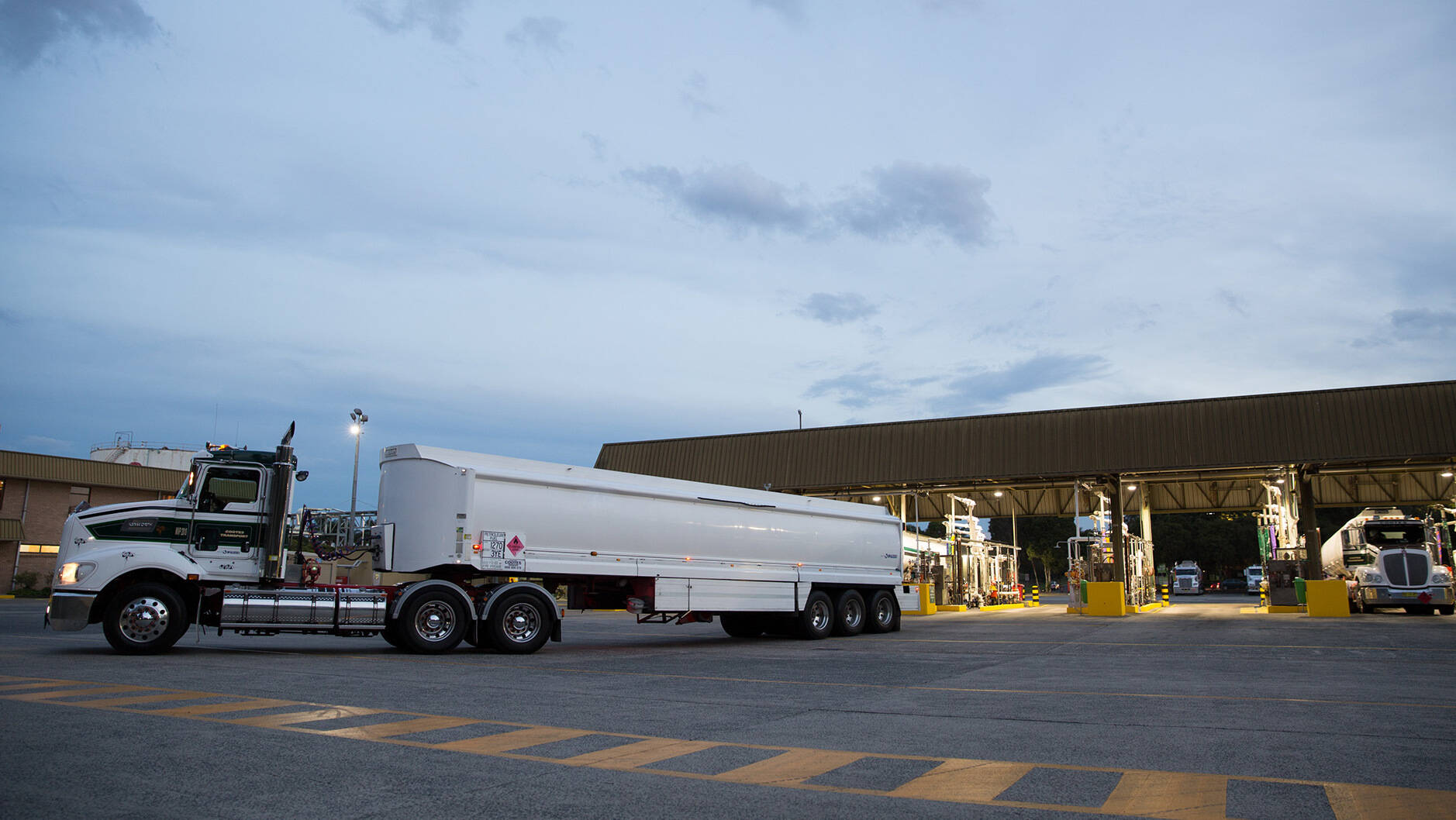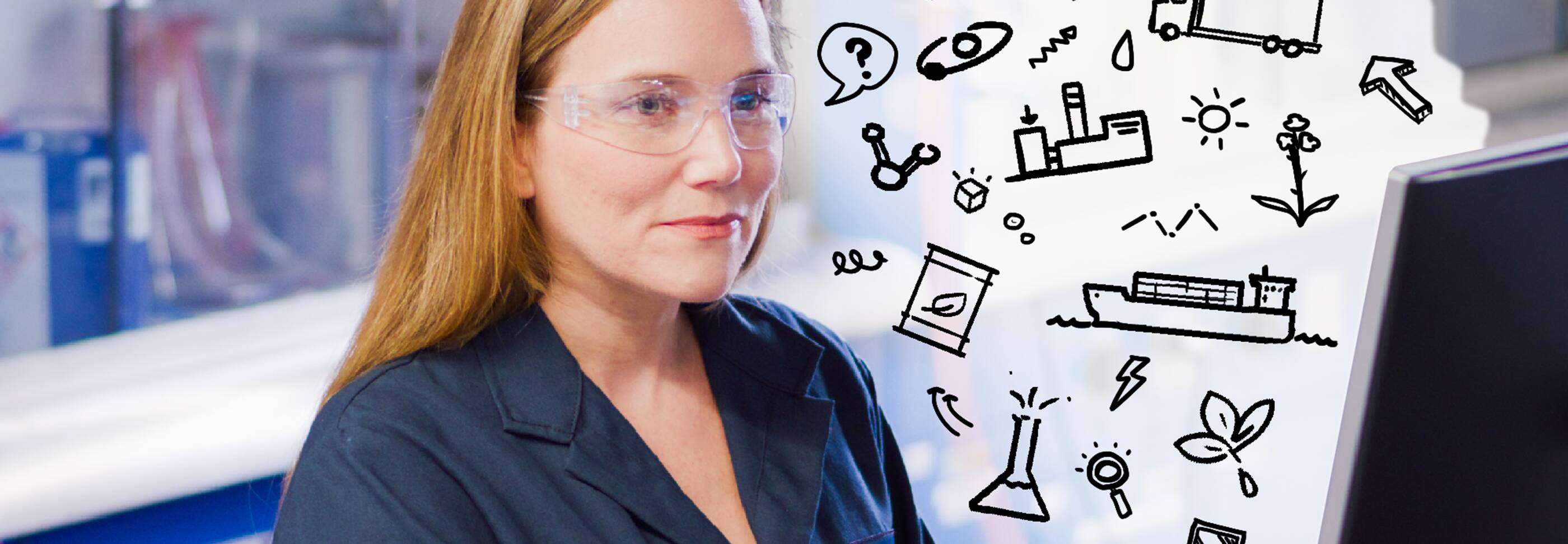selected item
The future of transportation fuels
February 11th, 2022
The vital task of reducing greenhouse gas emissions across the transportation sector requires a portfolio of solutions. Discover the lower-emission fuel alternatives ExxonMobil is working on to help power the future of transportation.
Reducing transportation greenhouse gas emissions is essential to managing the global energy transition – particularly as nearly a quarter of worldwide CO2 emissions from energy come from transportation.
ExxonMobil is exploring a mosaic of lower-emission fuel options, including second-generation, or advanced, biofuels and synthetic fuels created by using hydrogen and captured CO2 to form methanol.
Here’s a look at those efforts and the partnerships exploring these solutions.
What is the future of lower-emission fuels?
The ability to fuel transportation that produces fewer greenhouse gas emissions will depend on how lower-emission products are developed today. The adoption of electric vehicles continues to grow, but today that technology is largely used in passenger vehicles. ExxonMobil is working on a number of solutions to help advance new lower-emission fuels within the commercial and heavy-duty sector. Hear from ExxonMobil's chief fuels technology engineer, Krystal Wrigley, on the company's approach.
A portfolio of solutions
23 %
52.6 %
85% Reduction
Emissions
3M Metric tons
ExxonMobil's majority-owned affiliate, Imperial Oil, is moving ahead with plans to produce 20,000 barrels per day of renewable diesel with an anticipated start date of 2024, which could reduce emissions in Canada by about 3 million metric tons per year.
40% Reduction
Stena Bulk, a shipping company, conducted a successful commercial sea trial in 2020 of ExxonMobil's bio-based marine fuel, which has the potential to reduce greenhouse gas emissions by at least one-third, compared with conventional marine fuel oil.4
ExxonMobil has invested in Biojet AS, a Norwegian company that plans to convert wood waste into biofuels. The agreement enables ExxonMobil to purchase as many as 3 million barrels of product per year.
Designing the future of lower-emission transportation fuels is a challenge, but that's what makes it exciting. We are working to solve complex problems to help our world move more efficiently. It is really exciting to see where we can go.
Explore more

Superior Graphite, Superior Acquisitions for Synthetic Graphite Production
- We’re acquiring key assets and technology of Superior Graphite to complement our planned entry into the battery anode graphite market.
- Synthetic graphite powers electric vehicles (EV) and battery energy storage systems (BESS).
- This move boosts scale, American jobs and economic growth.
2 min read

Reconfiguring for growth: leveraging the strength of integration
- ExxonMobil makes Final Investment Decision for a major reconfiguration project, increasing production of higher-demand products like base stocks and diesel.
- Will position ExxonMobil as the only supplier offering the full range of Group I-V base stocks, helping to meet demand for premium lubricants.
- High-value products grow profitability, showcasing how deeply integrated facilities and unmatched scale across chemicals, lubricants, and fuels drive superior performance and shareholder value.
- Investment in Baytown secures local construction jobs, supports economic growth, and highlights the longevity of our assets.
2 min read

Fueling the future: Renewable diesel production begins at Strathcona Refinery
- ExxonMobil majority-owned affiliate, Imperial Oil Limited’s Strathcona Refinery, is now producing renewable diesel.
- At full capacity, the renewable diesel facility is expected to be the largest renewable diesel facility in Canada.
- The facility is now supplying customers in Western Canada and Imperial operations in Northern Alberta.
- The facility is sourcing bio-feedstocks from Canadian agricultural suppliers.
2 min read

Optimizing to meet global demand and higher living standards
- Improved global living standards are boosting demand for liquid fuels.
- With population increasing, global energy demand for transportation is expected to rise 20% by 2050.
- We are uniquely positioned to adapt to meet society’s need for fuels.
2 min read

Driving the automobile evolution for EVs and beyond
- We have a long history of pioneering automotive advancements.
- The essential fluids and materials we produce go into parts for all vehicle types.
- We continue to evolve to meet the world's transportation needs.
3 min read

From lab to track: our LEFs power Red Bull KTM Factory Racing
- ExxonMobil is Red Bull KTM Factory Racing’s official fuel and lubricant provider.
- Our science and technology expertise allows us to deliver custom, advanced products.
- For the 2024 season, we developed a unique lower-emission fuel.
2 min read






